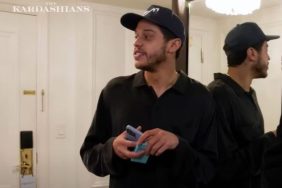When you want anger, you go to Lewis Black. The comedian and Daily Show correspondent has made a lifelong career out of furious tirades, ranting about everything from Valentine’s Day to complex political issues, and so it was probably natural that when Pixar decided to make a film about personified human emotions, they offered the role of Anger to him.
But when you sit down with Lewis Black, he’s as calm and sociable as anyone else. He made himself “vaguely comfortable” (as he described it) at the Beverly Hilton in Beverly Hills, CA just before we talked about his new part in the animated film Inside Out, the nuances of his anger, his difficult acting career and his advice for aspiring standup comics.
Inside Out premieres in theaters on June 19, 2015.

CraveOnline: So, “Pixar is offering me a movie, I’ll just do that?”
Lewis Black: That was it. I mean, if you listen to everybody else… if you’re an actor, or you’re anyone, and Pixar calls you, you say “yes” unless you’re an idiot.
They asked you to be Anger, which I guess you have turned into sort of a science by now.
Yeah.
What is anger to you? Is it something you still experience that passionately, or is it something that you can calculate now?
Well, there’s a difference. Anger in performance, on stage or standup, there’s a fine line. Once you cross that line you can get into trouble if you push it too far. And I get really angry on stage from time to time. Real anger can go a certain distance, and then unless you stop it, then you’re going to be working to get the audience back. If you stop it in time, and go “Oh, I’ve gone too far,” they get it. They also kind of enjoy [it]. They will enjoy a certain amount of it. But it really was a matter of learning what the line was. But personally when I get angry there’s no line.
On stage, where have you discovered the line? Is it just a matter of where the anger is directed, or is it an intensity, or…?
It’s an intensity. I don’t know how to describe it because it’s almost instinctive. You go up to that point where you’re performing… you know what it is? It’s without “vitriol,” a word that I would never use. That’s really what it is. You take that acid base out of it, and it allows people to know that you’re angry about it without it being something that’s kind of crippling you.

I look at your standup and your work on The Daily Show, and your anger is often very righteous. There’s a very distinct, valid reason to be angry. But here you’re representing the anger of a child, and the anger has to be a lot more… “primitive?” How would you describe it?
It’s nuanced, and it had to be toned down. What I realized was… I wish I’d known this at the time I was doing it, but you weren’t really conscious of it… it was through the direction of the anger, through Pete [Docter]’s direction of the anger. When directed out, when I’m pissed at an outside element, then it really goes. But when I’m dealing with the group it can only go so far. I’m Anger in a workplace.
Right. You’re angry because it’s your job to be angry.
Yeah, exactly. That’s the job.
I know that many animated films record their actors separately, but here it seems like the ensemble really worked well together. Was it still recorded separately?
Amy [Poehler] and Phyllis [Smith] recorded – because of the nature of the fact that they go on this journey together in the movie – the two of them recorded that together, which I thought was important.
The three of us, the other three – Mindy [Kaling], Bill [Hader] and I – did not record together. And as I’ve said time and again, the first thing that struck me when I saw the movie was that I don’t think it would have been better had we all been in the same room. It might have confused things.

How so?
Because you’ve got five very funny people who are going to fool around, who are going to try to – in a sense – out funny each other. Not to be funnier than, but we instinctively want to top [each other]. “You give me this, I’m going to want to take it there, and then we’re going to take it here.”
So I think it really made it. And [the filmmakers] had more of a sense of where we were in space and time, and we don’t. I feel there’s an ensemble there that is staggering. I mean, as good an ensemble as I’ve ever seen. But a lot of it has to do with the way in which those characters are placed and what they’re doing, as much as it had to do with the voices.
I see a lot of comedies, particularly motion pictures but also elsewhere, that seem increasingly improvised. Funny, but very thrown together. Inside Out feels very nuanced and written.
Yeah.
Is that a preference? What do you think of this trend in comedy?
I think when it works, it works. It takes really gifted people to pull that off. There’s not a lot of people who can pull it off solidly. Bill and Amy have certainly got that gift. So you just don’t throw it into the hands of [someone else].
What is your preferred mode of working on a film, be it live-action or animated? Do you approach it as a very serious actor, knowing everything you did that afternoon, very method, or…?

I mean it’s weird because I don’t really know. I did three films and I thought I did well in these three. I did three films in a row and I thought I did really well. [Laughs.] I did Accepted and Man of the Year and Unaccompanied Minors, and all were different roles and I thought, “Here, I can act.” And that was the end of my acting career.
So until Pixar came along I went into a kind of netherworld. And I did The Big Bang Theory, every so often I’d get a call… So I don’t really know, but I do know that I just really liked it. I’m doing this thing, I’m playing in a Bernie Madoff [project]. I’m not playing him, it’s a mini-series for ABC and I’m playing one of the guys who helps Madoff fuck people over. [Laughs.] I play a hedge fund guy.
Nice!
So a lot of that, I’m looking at the lines. It’s like, “Da-da-da-DA-da-DA-da.” You know? We’re not shaking any trees here.
For the record I thought Accepted was very funny.
Thank you. And of course, this is the luck of my career. A movie that literally begged for… you know, everything’s got a sequel except shit I’m in. Only I would end up in the movie where Justin Long, Blake Lively, Jonah Hill… those three within a minute get picked up, and now you can’t afford them. And I? “We don’t really need him! We’ve still got some of the other guys!” Nobody really pursued it.

Do you pursue acting? Are there roles that you want to pursue, or is your heart on the stage?
I really pursue the standup. That’s what I focus on. That’s my focus. There’s stuff that I would like to do. Look, I’ve pitched. I’ve been involved in, either I’m pitching or someone else has an idea that I like, we’ve done two a year for probably the last 15 years. And some of them have come to be written as scripts but maybe two of these things have seen the light of day, so I just kind of say “Fuck you, I’m done.”
I’ve been thinking about doing standup, and I think I’m going to give it a shot. Any advice?
Yeah. Do it. And do it again, and do it again, and do it again. The best thing is you can find some people you are kindred spirits with. Go around with them, find any place that they’re doing it, and get up on stage over and over and over again. Do you live here?
I live in L.A., yeah.
There are all these spaces. If you can find three or four other people who are interested in doing it, there’s a billion bars. Find a bar that needs something on a Monday or Tuesday night, say “We’ll bring in an audience,” and just start something. And if you start something then people come over to that, and then they go, “Oh, there’s this thing down the street. Do you know about that?”
And really, don’t have that fucking thing… Too many people think, “Okay, I’m here, but really I want to be here so I’m going to fucking get there.” Just, you take it one step at a time. See if you enjoy it, for starters.
But it really is do it over and over and over again. Dave Attell, me, Jon [Stewart], anybody will tell you. The one thing is there’s no shortest distance between two points. The shortest distance between two points is “do it.”
TheRantIsDue.com, if you go there, I do at the end of my acts a Q&A with the audience and on the internet. It goes around the world. So the ones that we’ve done already, some of them are on there, and you might get a kick out of it.
William Bibbiani is the editor of CraveOnline’s Film Channel and the host of The B-Movies Podcast. Follow him on Twitter at @WilliamBibbiani.








